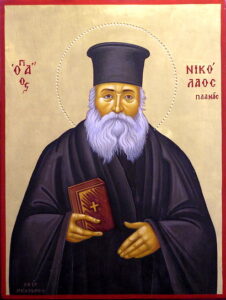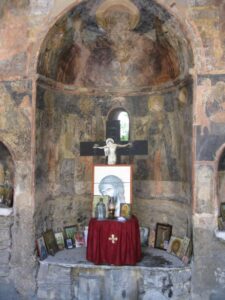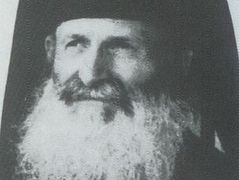Old age mind fog has caught up with me. Here it is only mid-February, and I have prepared a Post for a saint whose feast day is not till March 2, Ah well, we’ll certainly be prepared for it.

Saint Nicholas Planas
Introduction
I love that in our Orthodox churches we have icons in all directions – in front, in back, on the sides, and often up above – a sign that we are surrounded by the saints, most especially when we worship. For the most part, they portray saints looking almost alike, as they are now in their glorified state in the Kingdom. That’s as it should be. However, there is also a problem with that. The saints’ earthly lives were very different from each other.
It is the world that produces uniformity, conformity. In the world people tend to huddle together being very much alike – for protection, I guess? People like the same music, dress the same way, gather into the same political groups (of two types currently in America), and so on, changing only somewhat from generation to generation. I remember many years ago watching businessmen getting off a commuter train in the evening – all dressed alike, all wearing the same kind of hats (Then they all wore hats – now none of them wear hats.) Conformity – all following their particular trend-setters.
The Church, on the other hand produces saints who are exceedingly different from each other: hermits up in the hills who want nothing to do with the world, patriarchs leading millions of people, saints who live in poverty, wealthy saints who give lavishly to the poor, celibate saints, married saints, saints who refuse to talk, saints who preach at great length – I needn’t give you the whole list. So long as we all follow our one “Trend-Setter”, our Lord and God and Savior, Jesus Christ, the work of the Church is to bring out what is distinctive, unique in each of us.
And that leads us directly to the story of Father Nicholas Planas. You know what your parish priest is like. I know what I was like as a parish priest. Except in the very basics, Papa-Nicholas was extraordinarily different. That is what today’s story is all about.
As I approached this quiet little man, I wondered if I’d have enough material for a Post. But as I researched him, I found so much and I became so fascinated by him, that this has turned into a two-part Post, and I’m still omitting a lot.
Oh, for the sake of any Protestants who are here present: “Modern” for the Orthodox Church means in the past few hundred years.
His Early Life
 Nicholas was born in 1851 on the lovely * island of Naxos, out in the Aegean. His father owned a commercial fishing boat. He learned the very basics of reading and writing from his grandfather the priest George Melessougoros. The boy Nicholas loved the Psalter. He loved following his grandfather in the Altar, and travelling with him as he went from one little country chapel to another, and he learned his every movement.
Nicholas was born in 1851 on the lovely * island of Naxos, out in the Aegean. His father owned a commercial fishing boat. He learned the very basics of reading and writing from his grandfather the priest George Melessougoros. The boy Nicholas loved the Psalter. He loved following his grandfather in the Altar, and travelling with him as he went from one little country chapel to another, and he learned his every movement.
- It really is. I’ve been there. It must have been so hard to leave.
Here’s a strange story related later by his mother. The family were sitting by the fireplace one winter evening. Suddenly little Nicholas said, “Father, right now our boat, the Evangelistra, is sinking outside Constantinople.” His father asked “What is this child saying?” To allay his wife’s fears (partly for fear of losing the family living, partly because this sort of talk can come from strange sources, not all of them holy) his father said, “All small children have foreknowledge” – which of course it not true. But Nicholas did. The family’s boat was sinking. His words were a foreshadowing of what was to come.
Nicholas’ father died young, pained in his soul, partly for the loss of the family income and even more so in grief for the men who had been lost on the ship. This left Nicholas an orphan at age fourteen. Knowing not how to support the family, his mother took Nicholas and his sister to Athens, where there was a Naxiote community and more oppportunity.

At the time Athens was far smaller than the great city we know today. (This was before the great influx of refugees from Asia Minor – what is now Turkey – in the 1920s.) They settled near the Plaka, just south of the Acropolis, which then was at the edge of the city. It was hard. His mother worked cleaning homes and took her two children with her wherever she went, because she feared what might befall them in the city, where things were so different from life in a small town on the island.
When Nicholas reached seventeen years of age, his mother married him off to a girl from Kythira, another Aegean island, Elena Provelegiou. It was a normal marriage. They had one son. But not long afterwards Elena died, leaving Nicholas alone with a son to provide for.
His Ordination

Following his inclinations, Nicholas was ordained deacon in the Church of the Transfiguration, Plaka, on July 28, 1870. Five years later, on March 2, 1884, he was ordained a priest in the Church of the Holy Prophet Elisha – trusting in God’s mercy, because he had little money. He had given half his small inheritance to his sister, and had loaned the other half to a friend so he could be saved from debt.
This set the pattern for the rest of Father Nicholas’ life. He had compassion for others, and he had little care for money. Instead he was absorbed in prayer and worship and pastoral care at the small parish he had been given: Saint Panteleimon’s in Neo Kosmo (also just south of the Acropolis) which was comprised of only thirteen families. However, his people loved him for his kindness, his simplicity of life, his lack of material concern. Saint Panteleimon’s grew. People both rich and poor came to Divine Liturgy in numbers. Everyone wanted him to bless their homes and places of work. Whatever money they gave him, he quickly gave it away. The poor always waited outside the church for him to distribute. He was very affectionately and sincerely called Papa-Nicholas. *
- “Papa” is the affectionate Greek name for a priest. Why there’s always a hyphen between “Papa” and “Nicholas” I have not been able to discover.

Was everyone at Saint Panteleimon’s happy with Papa-Nicholas? Of course not. “Woe to you when everyone speaks well of you, for that is how their ancestors treated the false prophets.” Luke 6:26 Nor did Papa-Nicholas escape from ecclesiastical politics. Now that Saint Panteleimon’s was a “success”, a priest who had no parish, cooperating with a few Council members at Saint Panteleimon’s, somehow got Father Nicholas fired from that church and assigned to the tiny church of Saint John the Hunter in Vougliameni, then a village some miles down the south coast from Athens. The Church of Saint John the Hunter had only eight families. Eight! Papa-Nicholas’ official salary was one piece of meat on Meatfare Sunday and sometimes at Christmas.
Exactly how he supported himself and his son is never made clear, so far as I can find. Apparently the money and food they needed just seemed to arrive. *
- I know a certain parish today which has had the same experience,
At one level, his reassignment didn’t faze Father Nicholas. So long as he had a place to celebrate the Divine Liturgy he was satisfied. On the other hand, it hurt a lot of be thrown out of Saint Panteleimon’s which he loved and where he loved his people.
One evening as he was returning home to his little church, he was thinking about this and crying. Now, there was ordinarily no one on the road at that hour, so he was surprised to look up and see a young man, who asked him “Father, why are you crying?” Papa-Nicholas explained. “Don’t be afraid”, said the young man. “I am always with you.” Startled and confused, Father Nicholas asked, “But who are you?” “I am Panteleimon, who lives at Neo Kosmo.” And the young man vanished.
So far as we know, this was the first of Saint Nicholas’ experiences with saints and other heavenly phenomena, most of which we’ll talk about next week.
Papa-Nicholas’ indifference to worldly matters

Great sums of money would pass through his hands, but he kept nothing. He would immediately give it away. He gave more to young widows because, as he said, poverty tempts them to corruption.
Once a man in the parish gave him a considerable amount of money sealed in an envelope. Father Nicholas immediately gave it, still sealed, to a poor woman. The man who gave it to him said, at first indignantly but then with admiration, “Why, wouldn’t that blessed man even look at what I gave him?”
There’s little more to be said about this. His attitude towards money never changed throughout his life.
Father Nicholas’ Liturgical Practices
Let me say that if I had celebrated services like this, I would be long dead by now – either from exhaustion, or my people would have murdered me!… or would they?
For fifty consecutive years this holy man celebrated the Divine Liturgy daily from 8 a.m. till about 2 p.m. Seriously! No matter the weather, no matter how he felt, how matter what was going on at the time, even during the Anglo-French invasion of 1917 * which took place just up the coast between Vougliameni and Athens – nothing stopped him. He would celebrate the Liturgy at Saint John’s in Vougliameni or in small chapels on the south side of Athens day after day after day after day. People could scarcely believe it. I can scarcely believe it.
- A revolting display of Western imperialism. You should read about it.
To get around to various churches, he would take a taxi, which was a horse and carriage in his earlier days. One time a driver asked to be paid, and Papa-Nicholas had not a drachma in his pocket. He had given it all away, as usual. The carriage driver asked him, “Aren’t you the parish priest of Saint John’s, Father Nicholas?” “Yes, my child, I am.” “Then I don’t want your money. I just want your blessing.”
When Papa-Nicholas would enter a church, a stir would arise from the people. Some would kiss his hands, others his cassock, others his head, since he was quite short.

His Liturgies, as I said above, lasted about six hours? Why so long? Because people from all over would give him names of the sick or departed to be remembered at the Proskomidi. He kept the names on his Proskomidi list for years. He would place them in two large handkerchiefs to be tied up like a type of package, and place them on his hip. They usually amounted to two or three thousand commemorations! This took him two or three hours – every day. Every now and then some of his spiritual children, to give him some rest, would secretly take the old papers and rip them up. There were two packages, one with names and the other with holy relics. When people would ask him, “What are these packages?” He would answer, “My bills and my contracts”.
At the Liturgy he would always commemorate all the saints of the day, which are many. Today, February 14, as I am writing this, Orthodox Wiki lists over fifty. ( I think. I gave up counting after about thirty.) Imagine hearing twenty, thirty, forty, fifty Apolytikia/Troparia in a row! People would finally call out, “Father, give yourself a rest. Just say ‘and all the saints’.” But he never did. He would respond “I shall sing to my God as long as I live.” Psalm 193:33
Next Week: Papa-Nicholas Part Two – We’ll look at his “mystical life”, his dealings with people, his attachment to the Old Calendar, his death and glorification.
Week after Next: The Prodigal Son – repentance and forgiveness and stubbornness